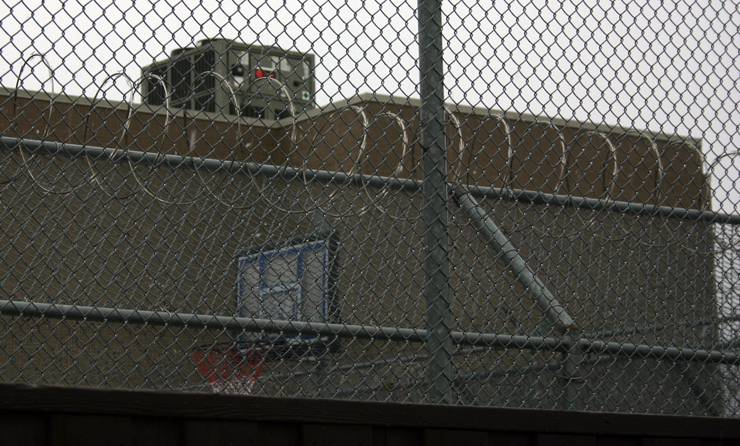Iranian refugee Masoud Hajivand will stay in jail in Lindsay, Ont. until at least January after an Immigration and Refugee Board official rejected a bail proposal offered by supporters today.

Hajivand, who has spent 173 days in maximum-security custody in the Maplehurst and Lindsay jails since his arrest in June, is locked in an apparently unresolvable deadlock with the federal government.
He has successfully obstructed attempts to deport him to the point that it’s impractical to put him on a commercial flight. As a public convert to Christianity from Islam, Hajivand says he fears imprisonment, torture and possible execution if he is returned to Iran. And because of what CBSA official Ann Mroue, who acted as a kind of prosecutor at the hearing, called his “extreme fear of return to Iran,” the IRB has ruled against granting him bail.
The Canada Border Services Agency can’t figure out how to return Hajivand to Iran, Mroue told the hearing. Two recent conference calls between senior CBSA officials looked at sending him through Frankfurt, Cairo and Turkey, all options which were rejected.
“The Minister (of Public Safety) is diligently pursuing his removal from Canada,” Mroue said.
READ: Cold, ill-fed, terrified: Ex-detainee recalls Lindsay jail ordeal
Hajivand is entitled to a detention review every 30 days.
Hajivand was first ordered deported in August, 2011 after his refugee claim was rejected, but didn’t show up to be deported. Since his arrest in June he has successfully resisted two attempts to deport him:
On Canada Day, six CBSA officers gave up on trying to drag him out of his cell as he wept and clung to the bars. On September 18, they got him as far as a cell at Pearson International Airport, where he tried to slit his wrists with a piece of metal he found in the cell.

Get daily National news
“Mr. Hajivand has not co-operated with removal attempts while in prison,” Mroue told the hearing. “There is no reason to believe he will co-operate if released.”
INVESTIGATION: Canada’s Unwanted
“Your actions show a very high level of desperation to remain in Canada,” IRB adjudicator Iris Kohler
Hajivand appeared by a video link from Lindsay. Dressed in an orange jail uniform, he looked hollow-eyed and tired. Spectators watched the hearing on another video link in a separate room in the CBSA’s Rexdale Blvd. complex near Pearson International Airport.
“Many (IRB officials ) are concerned that the presence of members of the media or the public could be a distraction which might interfere with the conduct of the hearing,” explained IRB spokesperson Charles Hawkins.
In her decision, Kohler warned Hajivand that his time in jail “could become lengthy,” adding that she “did not consider six months lengthy in an immigration context.”
“You have created the situation of your detention,” she said as Hajivand’s 16-year-old stepdaughter sobbed quietly.
Hajivand’s lawyer Anthony Navaneelan, hopes to get Hajivand released through another “pre-removal risk assessment” – Hajivand’s third – so he can argue returning Hajivand to Iran would be dangerous. Navaneelan has not been retained for the detention reviews, he said.
Spousal sponsorship could offer Hajivand another path to release – his wife, Pam Shiraldini, has offered to sponsor him – but applications are backlogged.
(Gambian refugee Muhammed Sillah was released from Lindsay in March, after 297 days in detention, when his spousal sponsorship was approved.)
Hajivand’s 173 days in custody are equivalent (allowing for earned remission) to an eight-and-a-half-month jail sentence. That’s equivalent to a typical sentence for a small-scale cocaine dealer.
Since Ottawa pays Ontario about $250 a day to jail federal immigration detainees, the bill for Hajivand’s incarceration works out to over $42,000 so far.
(In a small number of cases, immigration custody can become indefinite detention. An African man whose identity is in doubt has spent more than eight years in Lindsay.)
Because Hajivand arrived on an Air Canada flight without valid documents, the federal government wants the airline to pay for his ticket out of the country as an “airline liability case,” Mroue said.
Air Canada has refused to speak with Global News about this case or about its cooperation with CBSA more broadly.
A scheduled hearing on Monday was cancelled when Hajivand complained that the translator wasn’t fluent in Farsi. The hearing proceeded today with a different translator.
At last month’s hearing, a Global News reporter, Hajivand’s family, a surety and an expert witness from an electronic bracelet company all waited outside the hearing room, unaware that it had begun until after it had ended. Hawkins later said the public had been excluded by mistake.
Global News has since successfully applied for Hajivand’s detention hearings to be held in public.
In September, 2012, Canada closed its Tehran embassy; at the time, Foreign Affairs Minister John Baird called the Iranian government “among the world’s worst violators of human rights.”
Later that month, Prime Minister Stephen Harper told a New York audience that the Iranian government had an “appalling record of human rights abuse … the appeal of our conscience requires us to speak out against what the Iranian regime stands for.”









Comments